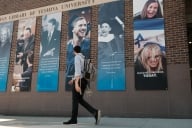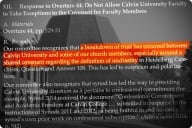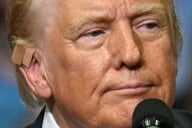You have /5 articles left.
Sign up for a free account or log in.
CHICAGO -- Not far from the entrance to the student center at DePaul University is a Roman Catholic chapel. The chapel, named after Saint Louise de Marillac, has a gold cross and candles and the usual trappings of Catholic worship, as might be expected at a Catholic college. But directly off the chapel is another room, a Buddhist sacred space. Upstairs, a Muslim prayer room abuts a Jewish kosher kitchen.
Enrolling students of other faiths isn’t unusual at a Catholic college. Nor is employing chaplains from those religions, as DePaul does, to serve their religious needs. But DePaul, the largest Catholic university in the country, believes it’s going further than most of its Catholic peers -- and further than most in higher education -- to create a religious identity that is as much about interreligious cooperation as it is about Catholicism.
Over the past decade, DePaul has become a laboratory for the Interfaith Youth Core, a group that works to encourage cooperation, service and dialogue among college students of different faiths. Part of that effort is an attempt to measure religious diversity and cooperation -- including asking students how much they know or understand about other religions not long after they’ve enrolled, and then measuring whether their knowledge and attitudes change while they’re in college. Results from that inventory will be available in September.
“One of the goals for us as a Catholic university, among the other goals a university would have, is we hoped people would walk out of here with a religious maturity too,” says the Rev. Dennis Holtschneider, DePaul’s president. “Part of that is learning how to talk to people different from you.”
Another part has been bringing education about other religions, and attempts to make them cooperate, into the classroom -- from the option to pursue a specialized minor in interreligious studies to an “interfaith scholarship” for 10 students each year from different religions, who work together to improve religious cooperation on campus. This fall, the scholarship recipients are Catholic, Muslim, Buddhist, Episcopalian, Baptist and Orthodox Christian, among other faiths.
DePaul has always welcomed students who aren’t Catholic or Christian, Father Holtschneider said, going back to the early 20th century, when other colleges in the area excluded Jewish students. Only about a third of DePaul's students are Catholic. And the college has been derided by some traditional Catholics -- including First Things magazine and the Cardinal Newman Society ---- for abandoning its Catholic roots. A blog post from the Newman Society, a self-appointed watchdog group, sums up the critique: "Catholics a Minority at DePaul. But Don’t Worry, There’s a Muslim Prayer Room."
Between 2004, when he took office, and 2006, Father Holtschneider received more than 10,000 e-mails, phone calls and letters accusing him of abandoning the Catholic tradition at DePaul, he said in an address to faculty that year.
“They would have us become an institution ‘of Catholics for Catholics,’ ” Father Holtschneider said. “That’s not DePaul. It never was. DePaul has always been a place where people of every faith have been welcomed to study and to teach.”
The university sees its interfaith mission as a key component of its Catholic identity, he says. But when the Interfaith Youth Core, which also serves as a consultant for campuses looking to encourage religious diversity and cooperation, began working with DePaul, they found the university had a more coherent strategy for ethnic diversity -- 35 percent of its undergraduate students are minorities -- than for religious diversity, said Eboo Patel, the group’s founder and president.
“DePaul had a coherent top-to-bottom, side-to-side strategy when it came to racial and ethnic diversity, but not necessarily top-to-bottom and side-to-side when it came to religious diversity,” Patel says. Among the questions the university needed to ask, he says: “How is being a model of interfaith cooperation anchored in DePaul’s identity?”
Religious colleges are often at the forefront of embracing Patel’s ideas, and many Catholic colleges have shown interest in his program, he says. That’s in part because they’re accustomed to talking about religion: “Interfaith cooperation is a very easy step for them to take,” he says. “It fits in the category of faith language and fits in the category of diversity. It’s just a different dimension.”
At DePaul, the university eventually included religious diversity and cooperation in its strategic plan, and started new efforts to move the focus on interfaith learning into the classroom, including the interfaith scholarships, Father Holtschneider says.
Most students at DePaul aren’t religiously active, so bringing campus ministries together for service or events would reach a minority of students on campus. (On the interfaith scholars’ blog, they noted some of the college’s events attracted only a handful of students.) Like most Catholic colleges, DePaul has a theology or religion requirement for all undergraduates. Unlike many of its peers, it has for years allowed students to take classes on any religion to fulfill that requirement. Students can now pursue a minor in interfaith studies as well, consisting mostly of classes on different religions, a change Father Holtschneider attributes to Patel’s influence.
Later this year, they will find out if their efforts have made a difference. DePaul is in the process of measuring students’ literacy about different faiths, through a survey developed by Patel’s group, and is expecting the results in September as part of a study that includes 20 other colleges.
Part of cooperation includes dealing with conflict. After arguments a few years ago between Muslim and Jewish students, the university moved the student groups’ meeting spaces next to each other in the student center, to encourage conversation and cooperation, Father Holtschneider says. That change largely worked to calm tensions, though disagreements still arise.
“If there’s any tensions in the world, they duplicate inside your institution for a time,” he says. Earlier this year, the university’s chapter of Students for Justice in Palestine had a table at a student event that some perceived as anti-Israel. “Every time there’s a tension, they just know, O.K., DePaul’s going to make us talk.”
Father Holtschneider says he’s seen similar efforts at other Catholic colleges -- Georgetown University also has chaplains of other faiths, and its School of Foreign Service has a long history of encouraging cooperation between Catholics, Jews and Muslims. But he said he’d like to see more colleges follow suit and incorporate interfaith efforts into their Catholic identity.
“If you’re trying to create someone to go out in the world and make a difference these days, they need a religious maturity as well, in whatever faith tradition they come in,” he says.








